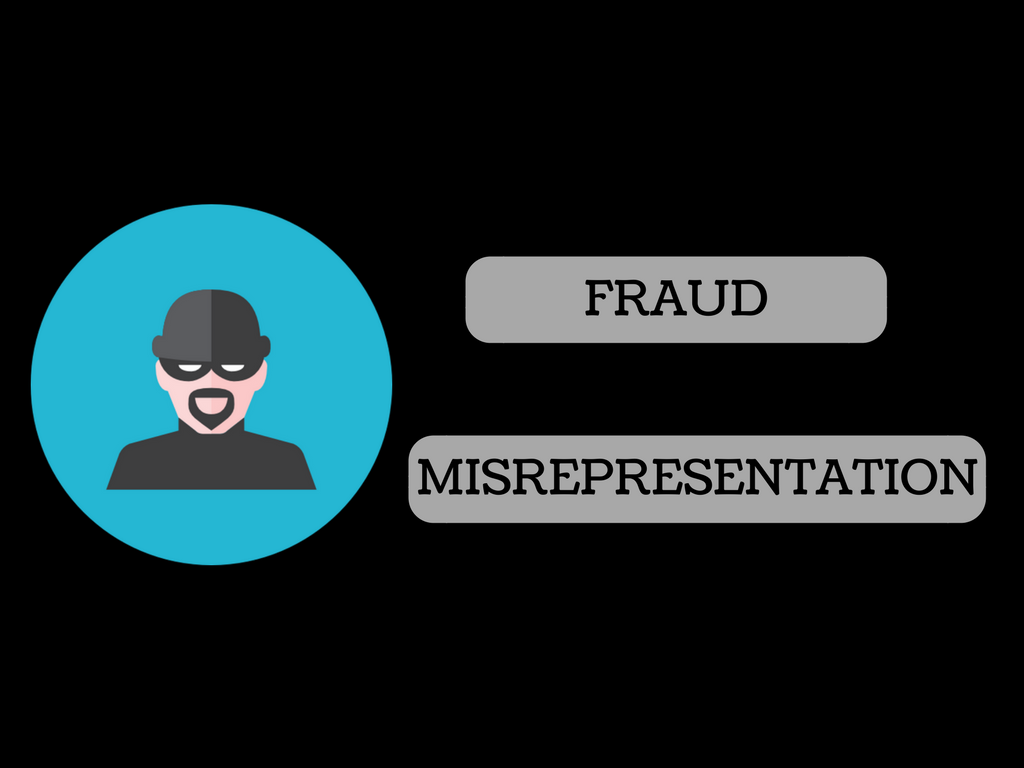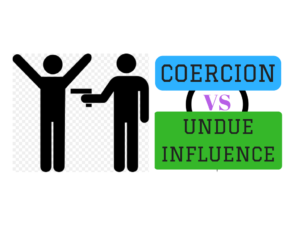Fraud and Misrepresentation are the terms related to obtaining a Consent of a party to enter into an agreement between two or more persons. To enter into the contract, The parties required to get each others consent. Some people use different types of unfair practices to obtain the consent of another party. These unfair practices are as follows:
⦿ Fraud
⦿ Misrepresentation
⦿ Coercion
⦿ Undue Influence
⦿ Mistake
This article presents you the top differences between Fraud and Misrepresentation. These two terms are used as alternatives by many of us, but there exist many differences between them. They are as follows.
FRAUD
Fraud is the action which can be easily defined as willfully or intentionally cheating or deceiving other people by communicating false information to obtain their consent. Section.17 of the Indian Contract Act, 1872 stated that any action to be considered as Fraud should include one or more of the following:
⦿ A person knowingly or intentionally wants to deceive other parties.
⦿ The person has knowledge of material facts but misrepresented them to gain the consent of the other party.
⦿ A person made a promise to the other party without an intention of performing it.
⦿ A person did any other act intentionally to cheat the other party.
⦿ Doing any actions which are declared as fraudulent by the law also amounts to Fraud.
EXAMPLE
If Mr.X took a loan from Mr.Y with the intention of not paying the money back. Then it is said that Mr.X committed Fraud.
It is not treated as Fraud If the party stays silent in matters of presenting the facts which are likely to affect the willingness of the other party. If the consent of other party is gained by performing Fraud, the contract becomes voidable at the option of the person who is injured.
MISREPRESENTATION
Misrepresentation is the action which can be easily defined as a false communication of facts made unintentionally or innocently. Misrepresentation is treated as Fraud if there is an intentional false communication of facts to gain the consent of the other party. Section.18 of the Indian Contract Act, 1872 stated that any action to be considered as Misrepresentation should include one or more of the following:
⦿ There should be a false communication of information by one party to another party without an intention to deceive.
⦿ The Misrepresented information must relate to the material fact and should not be expressed as an opinion.
⦿ The person who communicated false information believes it is as true and he is not aware it is false.
EXAMPLE
Mr.X tells Mr.Y that his TV is in good condition and asked him to buy, Mr.Y bought Tv from him because of the trust he had in Mr.x. After some time the TV does not work properly and Mr.Y thought he is misled by Mr.X but Mr.X believed that his TV is good and he does not communicate false information to Mr.Y.
If the consent of the party is gained by misrepresentation, then the contract becomes voidable. The party who got ill impacted by the Misrepresentation can cancel the contract with the other party.
COMPARISON TABLE
| FRAUD | MISREPRESENTATION |
|---|---|
| Fraud is defined as the intentional and willful act of false representation of information to deceive the other party. | Misrepresentation is defined as an Unintentional or innocent act of false representation of information to the other party. |
| Enacted by | |
| Section 17 of the Indian Contract Act, 1872 defined the term fraud and its characteristics. | Section 18 of the Indian Contract Act, 1872 defined the term Misrepresentation and its characteristics. |
| Consent | |
| The consent of the party is obtained by committing a fraud by the other party. | The consent of the party is gained because of the misrepresentation of information by the other party. |
| Action | |
| Fraud is an action of dishonest i.e one party deceives another by not communicating the original information. | Misrepresentation happens when one party communicates the information which is false but believed it as true. |
| Consequences | |
| In case of fraud, the party who got deceived can cancel the contract and claim for the damage. | In case of Misrepresentation, the party who is mistreated can cancel the contract. |
| Legal Action | |
| The people who committed Fraud is punishable under Indian Penal Code. | The people who are involved in Misrepresentation is not bound to be punishable according to the law. |
CONCLUSION
By the above discussion, we can conclude that Fraud is a willful act and Misrepresentation is an unintentional act. In Fraud, one party deceives another party and in Misrepresentation, both the parties got deceived because of believing the information is true but actually the information is false.
In case of fraud, the damage happens to one party only whereas in Misrepresentation both the parties are misguided unknowingly and got damaged.




